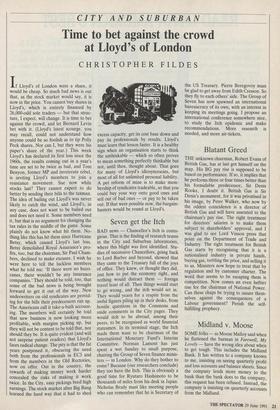CITY AND SUBURBAN
Time to bet against the crowd at Lloyd's of London
CHRISTOPHER FILDES
If Lloyd's of London were a share, it would be cheap. So much bad news is out that, as the stock market would say, it is now in the price. You cannot buy shares in Lloyd's, which is entirely financed by 26,000-odd sole traders — but that struc- ture, I expect, will change. It is time to bet against the crowd, and let Bernard Levin bet with it. (Lloyd's latest scourge, you may recall, could not understand how anyone could be so foolish as to tip Polly Peck shares. Nor can I, but they were his paper's share of the year.) This week Lloyd's has declared its first loss since the 1960s, the results coming out in a year's time are set to be twice as bad, and Tom Benyon, former MP and inveterate rebel, is inviting Lloyd's members to join a resistance movement. Sue now while stocks last? They cannot expect to do better by sending their bills to the taxman. The idea of bailing out Lloyd's was never likely to catch the wind, and Lloyd's, in any case, does not want to be bailed out and does not need it. Some members need it, but that is no argument for changing the tax rules in the middle of the game. Some plainly do not know what hit them. No- thing like this has hit them since Hurricane Betsy, which caused Lloyd's last loss. Betsy demolished Royal Assurance's pro- fits, too, but the chairman, Sir Paul Cham- bers, declined to make excuses. I wish he were here to tell the luckless members what he told me: 'If there were no hurri- canes, there wouldn't be any insurance companies.' They should be told, too, that some of the bad news is being brought forward to get it out of the way. New underwriters on old syndicates are provid- ing for the bills their predecessors ran up. The Americans call it take-a-bath account- ing. The members will certainly be told that new business is now looking more profitable, with margins picking up, but they will not be content to be told that, nor should they be. It is quite evident (and will not surprise patient readers) that Lloyd's faces radical change. The pity is that the fat years postponed it, obscuring the need both from the professionals in EC3 and from the members in the Old Rectories, now on offer. Out in the country, the rewards of making money work harder concealed the risks of making it work twice. In the City, easy pickings bred high earnings. The stock market after Big Bang learned the hard way that it had to shed excess capacity, get its cost base down and pay its professionals by results. Lloyd's must learn that lesson faster. It is a healthy sign when an organisation starts to think the unthinkable — which so often proves to mean something perfectly thinkable but not, until then, thought about. That goes for many of Lloyd's idiosyncracies, but most of all for unlimited personal liability. A pet reform of mine is to make mem- bership of syndicates tradeable, so that you could buy your way onto good ones and sell out of bad ones — or pay to be taken out. If that were possible now, the bargain- hunters would be round at Lloyd's.


















































 Previous page
Previous page